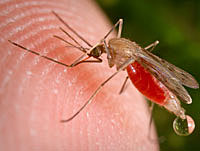2007年VOA标准英语-US Government Tries to Educate Doctors, Patient
搜索关注在线英语听力室公众号:tingroom,领取免费英语资料大礼包。
(单词翻译)
By Carol Pearson
Washington
23 May 2007
The parasite1 that causes malaria2 is wiped out in the United States, but the disease can still cause problems. Doctors so rarely see patients who have it, that they do not always recognize malaria's symptoms. The U.S. Centers for Disease Control and Prevention is now trying to educate American doctors and patients about the symptoms and treatment of malaria. VOA's Carol Pearson has more.
Dr. Phyllis Kozarsky is a malaria specialist at Emory University in Atlanta, Georgia. "We see a case of malaria in our clinic probably about once a month now. So it's becoming more frequent."
 |
| Malaria is spread by mosquitoes |
People get it when bitten by an infected mosquito. When American travelers visit countries where the disease is prevalent, or when immigrants or visitors from these countries come to the U.S., they may bring the disease with them.
"We get a lot of requests for assistance with diagnoses and management of malaria," says Kozarsky.
Dr. Monica Parise and her colleagues at the U.S. Centers for Disease Control and Prevention created new guidelines for diagnosis3 and treatment, available on the Internet at the center's web site, CDC.gov/malaria. The guildlines can also be found in the Journal of the American Medical Association. "We think we've come up with very comprehensive guidelines that can be useful to clinicians if they have patients who travel and come back with malaria."
Malaria can be hard to diagnose, because its main symptoms, fever and fatigue4, are present in many illnesses. The guidelines include lots of detailed5 medical information about blood tests for diagnosis, and different drugs for treatment. But there are simpler guidelines as well. "Both doctors and patients can do a lot so malaria isn't missed. When doctors are evaluating a patient who has a fever, they need to ask about a travel history to find out if somebody's gone to a malarious6 area."
And patients need to tell doctors about their travels. Amy Wald did just that when she returned from a visit to Africa and felt feverish7 and exhausted8. She called her regular doctor, but ended up seeing a specialist. "I wouldn't expect an American doctor to know what to do when a patient comes in with malaria."
Dr. James Maguire says that is a major problem. He specializes in parasitic9 diseases at the University of Maryland Medical School. "I think we have a problem in medical education in some, not all, medical schools where parisitology teaching has been de-emphasized, so many physicians haven't had much background information, and so oftentimes, they are taken by surprise and miss the diagnosis."
The U.S. Centers for Disease Control and Prevention wants doctors and patients to know more about the dangers and treatment of malaria to keep this disease at bay in the U.S.
 收听单词发音
收听单词发音 




